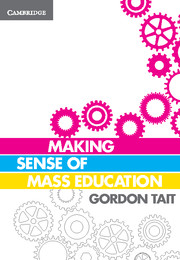Book contents
- Frontmatter
- Contents
- Acknowledgements
- INTRODUCTION
- PART 1 RE-ASSESSING THE THREE PILLARS: MODERN AND POSTMODERN SOCIOLOGIES OF EDUCATION
- PART 2 THE FOUNDATIONS OF AN ALTERNATIVE APPROACH: EDUCATION AND GOVERNANCE
- PART 3 CULTURAL CONTEXTS OF CONTEMPORARY EDUCATION
- PART 4 PHILOSOPHY AND MASS EDUCATION
- CONCLUSION
- References
- Index
PART 2 - THE FOUNDATIONS OF AN ALTERNATIVE APPROACH: EDUCATION AND GOVERNANCE
- Frontmatter
- Contents
- Acknowledgements
- INTRODUCTION
- PART 1 RE-ASSESSING THE THREE PILLARS: MODERN AND POSTMODERN SOCIOLOGIES OF EDUCATION
- PART 2 THE FOUNDATIONS OF AN ALTERNATIVE APPROACH: EDUCATION AND GOVERNANCE
- PART 3 CULTURAL CONTEXTS OF CONTEMPORARY EDUCATION
- PART 4 PHILOSOPHY AND MASS EDUCATION
- CONCLUSION
- References
- Index
Summary
Making the move from modern to postmodern forms of social analysis is not the only option open to those unhappy with the shortcomings of the traditional social class/gender/race approach. It is possible to step out of this paradigm, and to address mass education, and society in general, from another direction altogether. Part 2 will explore the possibilities associated with this alternative direction. Not only does this alternative approach ask different questions, it also asks them about largely different elements of the social fabric, and it underpins its ideas within entirely different domain assumptions.
The theories outlined in Part 1 – even those more clearly postmodern in orientation – tend to ask questions about who has what, and who is exercising power over whom, while focusing primarily upon issues of disadvantage and inequality. This model is built upon a coercive understanding of power, one that describes struggles over resources and access, one which notes who wins and who loses, and one which positions mass education as ground zero in the ongoing battles between classes, genders and races,
The approach taken in Part 2 is very different. Largely based upon the work of Foucault, the questions it asks focus more upon the ways in which institutions like the school produce particular kinds of individuals, both as objects of knowledge, and as objects of governance. Power is no longer regarded as necessarily coercive; rather it is usually productive; it brings new ways of understanding, and new identities, into being.
- Type
- Chapter
- Information
- Making Sense of Mass Education , pp. 79 - 80Publisher: Cambridge University PressPrint publication year: 2012



